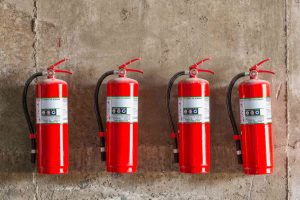
It’s easy to think that the fire extinguishers we keep in our homes and businesses are always ready to go in case of a fire.
It’s easy to think that the fire extinguishers we keep in our homes and businesses are always ready to go in case of a fire. The problem with this belief is that it is a misconception. Fire extinguishers will need to be recharged. Here is some necessary information on how that happens.
When to Recharge
Every time a fire extinguisher is used, it needs to be recharged. You shouldn’t wait to do this in case you need to use it again and then find you don’t have any foam left to discharge. Although you might think that the extinguisher will be okay if there is some foam left inside it, it needs a professional to look at it before it can be returned to service. Whenever you discharge the contents, even a little bit, you could allow a leak to form. Leaks aren’t dangerous just because of what might spill out – that might not even happen – but you need to watch out for loss of pressure, which will reduce the effectiveness of the fire extinguisher in question.
Every so often, you should recharge your current set of fire extinguishers. This applies even if they haven’t been used in a while. That’s because you don’t want the fire extinguisher to dry up. Besides, they might be damaged, and you might not even know it without adequate inspections being carried out.
Reading the Pressure Gauge
Inspections should be performed at least once a month. During this inspection, make sure there is enough pressure based on the reading on the gauge. The gauge will indicate the current status level: if it’s overcharged, undercharged, or optimally charged.
What Happens Next
When your fire extinguishers need recharging, rely on professional expertise. Fire protection experts will bring all the tools, parts, and know-how to refill your fire extinguishers and make sure they are fully functional. Generally speaking, the extinguisher is depressurized, and any suppression agent left inside is drained. The discharge valve and siphon tube are then removed before any cleaning takes place. Once cleaning is finished, the old components are replaced with brand new ones. Technicians re-pressurize the extinguisher before confirming that it isn’t leaking. Then the extinguisher is weighed to verify it isn’t too light or too heavy.
Commercial and Residential Fire Prevention from Judd Fire Protection
If you want to ensure your home and business are safe throughout the year, trust Judd Fire Protection, LLC. We have over two decades of experience in designing, installing, inspecting, and repairing residential and commercial fire protection systems. We serve clients throughout Maryland, Pennsylvania, Washington, D.C., Virginia, and West Virginia. If you are interested in finding out more about our services and protecting your home and business, give us a call at 410-871-3480 or contact us online. For more fire safety tips, follow us on Facebook, Twitter, and Pinterest.
